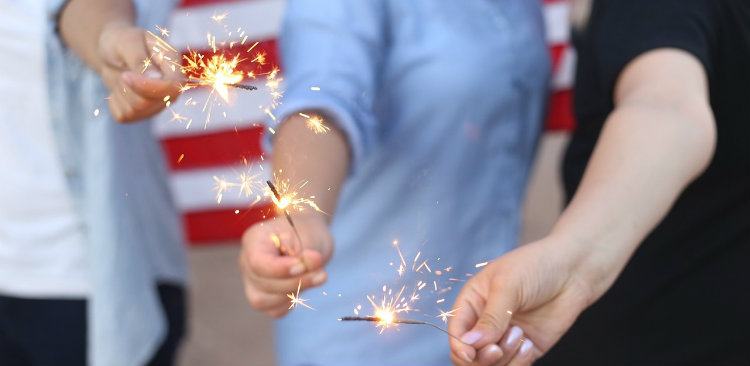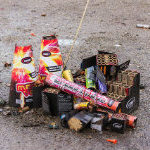
Large, professional displays of fireworks are beautiful and fun to watch; however, they can be dangerous if not handled properly or in a safe manner. Learn more about the dangers of fireworks and the risks involved so you can be safe for the holiday.
 Never allow children to play with or ignite fireworks, including sparklers.
Never allow children to play with or ignite fireworks, including sparklers.Source: CPSC
Many fireworks injuries involve the hands, head, eyes, arms and legs.
Hands tend to be the most injured body part since many fireworks are typically held. Fireworks can result not just in severe burns, but when they explode while in the hand, they can tear the hand apart or cause severe damage to the muscles, impairing future use. One or more fingers can be lost, too.
Other types of injuries include:
 Misuse of fireworks. Most injuries caused by fireworks are the result of misuse, for instance, lighting the fireworks improperly, lighting them too close to others or lighting them while holding them in your hand.
Misuse of fireworks. Most injuries caused by fireworks are the result of misuse, for instance, lighting the fireworks improperly, lighting them too close to others or lighting them while holding them in your hand.
Improper use can injure not just the person handling the fireworks, but also bystanders. Fireworks, such as bottle rockets, can injure onlookers by taking unpredictable paths.
Failed to explode. Another potential danger is a firework that has been ignited and failed to explode. These should be handled carefully because they could still be active and explode.
Danger of sparklers. Sparklers are used a lot by young children because we assume they are safer; however, they can be more dangerous than you realize. Sparklers burn at about 2,000 degrees, hot enough to melt some metals and the sparks can catch clothes on fire or cause burns to the skin, especially sparks falling on feet.
Malfunction. While it doesn’t happen as often, fireworks can malfunction due to a manufacturing or design defect.
The best way to enjoy fireworks on 4th of July (or any time) is by watching a public display, and letting trained professionals handle the fireworks under controlled settings and regulations.
If you would like to receive news and blog updates on a regular basis, sign up to receive our email newsletter. Your email address will only be used to send you our newsletter and respond to inquiries.
Our knowledgeable staff is available at (877) 284-6600.
If you have been seriously injured in an accident that is the result of another’s negligence, call Nash & Franciskato at (877) 284-6600. One of our experienced staff will speak with you personally and will provide you with a free, no-obligation review of your case.
START YOUR FREE CASE EVALUATION TODAY
Past results afford no guarantee of future results and each case is different and is judged on its own merits. The choice of a lawyer is an important decision and should not be based solely upon advertisements.
Editor’s Note: This post was originally published June 22, 2017. It was reviewed on June 27, 2023, updated for content and accuracy and re-published on June 29, 2023.